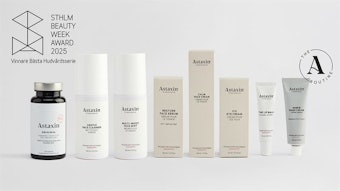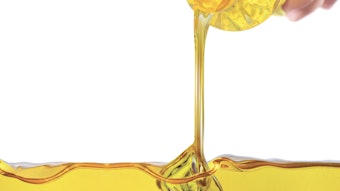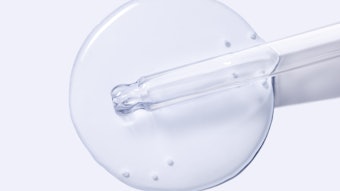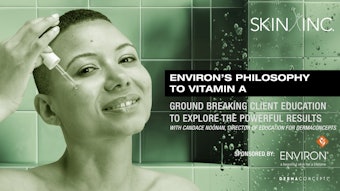More and more often, formulators are looking to raw material suppliers for demonstrations of the efficacy, safety and functionality of new ingredients, such as peptides. Spas that are sellers of finished formulated products also need ingredient information to convince clients to purchase products, as well as to differentiate brand offerings. Are spas and medical spas getting all the ingredient
| Michael Gold, MD, on Professional Skin Care "I don’t use the term “professional” to identify a class of products. You come to my medical spa and see privately labeled products. They are professional products, but they are still either a cosmeceutical or a cosmetic. The only other valid product class is a prescription product." |
International management consulting and market research firm Kline & Company’s recently released 2006 study of the professional skin care market1 reports a sixth consecutive year of double-digit growth, as well as a shift in distribution, with spa professionals and physicians facing stiff competition from retail channels, including some chain drug stores and other mass merchandisers. This retail competition is resulting in spas that are increasingly seeking help from product marketers to hold on to their share of this booming market, according to Kline & Company.
“Almost all of the 300 dermatologists, plastic surgeons and spa managers interviewed for the study said they wanted to see more in the way of providing product samples, training and educational materials to help them sell the products,” says Carrie Mellage, director, consumer products, Kline Research. “More than 80% of both spas and physicians surveyed consider product samples the best form of support, but there seems to be a gap in marketers meeting that request.”
Kline’s 2006 study is available by subscription only, but the firm did provide some excerpts from the previous year’s report, which shows that professional skin care sales accounted for 12% of the $42 billion global skin care market in 2005; nearly 72% of those global sales were in Europe.
“Professional” products
The term “professional product” is common in the spa industry, but what does it really mean?
According to John E. Kulesza, president and founder of Young Pharmaceuticals, Inc., in Wethersfield, Connecticut, when his company formulates a product for the spa environment, it might use a different set of raw materials and concentrations versus products that would be sold to the dermatologist or plastic surgeon.
Michael Gold, MD, dermatologist and medical director of the Gold Skin Care Center, the Tennessee Clinical Research Center, the Laser & Rejuvenation Center and the Advanced Aesthetics Medi-Spa in Nashville, Tennessee, says that he doesn’t understand the term.
| John E. Kulesza on Professional Skin Care "The difference between products for the spa world and products for the medical world starts with ingredients and their concentration." |
To Cherie Dobbs, founder, president and CEO of Dermastart, Inc., a “professional product” is one that is not sold through department stores, drug stores or other mass-market outlets. “It should be offered through higher-end medical spas, and through estheticians and physicians who have gone to school and learned about the product line,” she explains.
Ingredients
As some of the most explored, researched marketed components of spa products, ingredients offer a variety of benefits—along with a host of issues. Following are some of the most popular ingredient trends.
Fragrance. The importance and benefits of scent vary drastically from spa products to pharmaceutical products. “Almost all of the products we make for the dermatological field are fragrance-free,” explains Kulesza. He cites the reason for this being the potential for allergic reactions due to the complex mixtures of biomolecules that make up fragrances. “The spa industry has a very different approach. Aromatherapy and very nice-smelling products are a tradition within the industry—and that’s why they’re very popular,” he says. “However, if you look at it from a strictly medical or clinical standpoint, fragrances are inappropriate. Whatever the product smells like because of the characteristic odor of the raw materials, then that’s the way the product has to smell.”
Preservatives. Preservatives are another hot topic in the ingredient realm. In this instance, though, Kulesza says the spa and
| Clarice Loiacono on Professional Skin Care "Spa people are very visual people. That’s why before and after pictures and classroom presentations work well for us. |
Peptides. Peptides are another ingredient making headlines. According to Kulesza, the advantage to peptides is that they can be viewed as natural materials that seem to be safe and stable without causing allergic reactions or other irritations. “The theory behind some of the peptides that are most commonly used is that they mimic fragments of proteins that are found in the skin. These various amino acid sequences are the same as the amino acid sequence of, perhaps, a piece of collagen. It’s a sort of signal for fibroblasts—cells that make collagen—to make more collagen,” says Kulesza.
There are questions that need to be answered about peptides, however. He ponders whether peptides are capable of penetrating through the stratum corneum all the way down to the basal layer of the epidermis, where living fibroblasts exist. If this kind of penetration did exist, it would cause peptides to be classified as drugs. “That is not something that cosmetic marketers want, because it would have to be regulated like a drug and it would raise a whole different set of questions,” explains Kulesza.
Training and support
With the inclusion of new ingredients, suppliers are charged with the necessity to offer information and support, but are they up to the challenge? The need for this type of information seems to vary dramatically from spa professional to physician. According to Gold, the physician is concerned with the black and white details.
“Knowing the actives and the irritant potential is the most important thing to us physicians,” he explains. “I think that most of us
| Cherie Dobbs on Professional Skin Care "A professional product is one that is not sold through the mass market." |
According to Dobbs, information about ingredients and other product content is crucial to the retail side of a spa. “Thorough knowledge of ingredients in skin care product sales is by far the most important key to a successful retail program. A well-educated skin care therapist is able to correctly advise the client on the most appropriate products, ensuring maximum results,” she explains. Because new ingredients and cutting-edge technologies are always available, it is essential that the professional skin care therapist stay abreast of all the new emerging ingredients, she says. “It’s not just important to know what to use, but also how to combine different products for maximum efficacy.”
Clarice Loiacono, owner of Clarice’s Creating Beautiful Looks, an independent spa in Wheaton, Illinois, agrees. “As a spa person, I think it’s important for the product supplier to give you training on the product’s ingredients, how they work and why they are at certain percentages. Basically, that’s good product knowledge.” She also stresses the need for handouts, samples and before-and-after photos. “If you’re telling me a specific ingredient does X, I want to see pictures showing that it really does. Spa people are very visually oriented. That’s why these pictures and classroom presentations work for us. We want to know the science, but we need it in a form that we can understand,” she explains.
Pep talks
Face & Body Spa & Healthy Aging Conference and Expo is an industry event that offers a forum to connect spa industry professionals with their colleagues who serve the healthy aging, wellness, personal care, fitness, cosmetic and nutrition industries. Its full-day, multitrack conference provides attendees with a product-neutral, advanced education conference program designed for skin care professionals. The expo offers more than 500 booths featuring
300 industry suppliers and manufacturers, as well as product education through Manufacturer Classrooms. Face & Body is held in San Francisco in August, and 2007 marks its 15th anniversary. There, you can network with others to find out more thoughts and opinions on ingredients, training and everything in-between.
REFERENCE
1.Doctors, spas looking to professional skin care brands for support, according to Kline survey, a Kline & Company press release (Jan 30, 2007), www.prnewswire.com/cgi-bin/stories.pl?ACCT=104&STORY=/www/story/01-30-2007/0004516185&EDATE= (Accessed on Feb 19, 2007)










